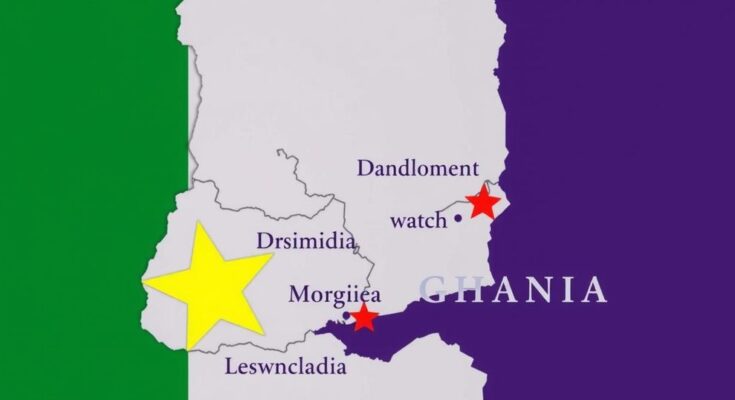Ghana’s parliament risks failing to approve a provisional budget before the December 7 elections, potentially leading to a government shutdown early next year. Ongoing disputes over parliamentary majority control have kept Parliament on recess since October 23. Experts warn of significant impacts on governmental operations and worker salaries, urging a resolution before January.
Ghanaian parliamentarians might fail to approve a provisional budget prior to the general elections scheduled for December 7, resulting in a potential government shutdown in early 2024. As Ghana prepares to elect a new president following the end of Nana Akufo-Addo’s two-term presidency in January, it is customary to pass a provisional budget to sustain government operations during the transition. However, experts and former officials express concern regarding the current parliamentary impasse, which has led to an indefinite recess since October 23, primarily due to disputes over legislative majority.
Seth Terkper, a former finance minister, cautions that without a budget, Ghana might face significant reductions in governmental spending and a postponement of crucial payments after December. The situation has become precarious, as it represents a potential first occurrence of its kind in over three decades for Ghana, a country known for being the second-largest cocoa producer globally.
The discord within Parliament has intensified following a Supreme Court ruling that deemed the Speaker’s previous declaration of the parliamentary majority as unconstitutional. Accordingly, Speaker Alban Bagbin has resisted calls to reconvene Parliament, asserting that it could hinder electoral activities. Senior lawmakers have also highlighted the unprecedented nature of this circumstance and the pressing need to remedy it swiftly.
The current political climate is dire as the Finance Ministry has failed to comment on the crisis. In anticipation of a provisional budget, Finance Minister Mohammed Amin Adam set a deadline for November 15, which has now passed. Labor unions are particularly concerned, as they fear the budget impasse will adversely affect the salaries of workers should governmental operations be curtailed. Joshua Ansah, the head of the Trades Union Congress, expressed the urgency of resolving this budget issue to prevent salary disruptions.
The issue at hand arises in the context of Ghana’s upcoming general elections, where a failure to pass a provisional budget could lead to unprecedented governmental challenges. Typically, in election years, a provisional budget is enacted in November to sustain government functions until the new president is sworn in. This practice allows the government to maintain essential services and operations during the electoral transition, which is critical for public confidence and economic stability. The current parliamentary crisis stems from disputes over majority control, resulting in an extended recess that prevents effective legislative action. This situation threatens to disrupt government functions, which experts warn could lead to lean spending or a complete shutdown.
In summary, Ghana stands at a critical juncture as parliamentary inaction threatens to derail the customary passage of a provisional budget ahead of the upcoming general election. The implications of a shutdown or curtailed government operations could be far-reaching, affecting not only financial management but also worker salaries and public services. Stakeholders urgently call for expedient resolution to avert adverse consequences, emphasizing the necessity for parliament to resume deliberations swiftly.
Original Source: www.usnews.com




